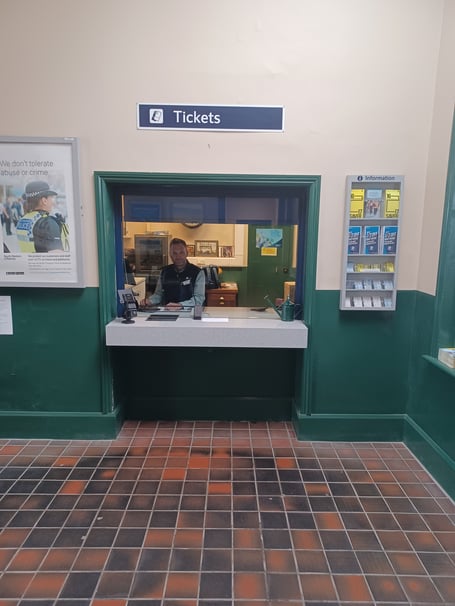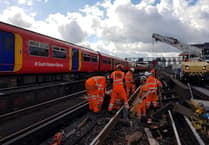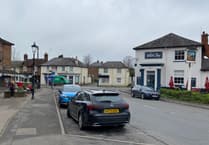Plans to close rail ticket offices have been withdrawn by South Western Railway following an outcry by passengers, politicians and rail watchdogs.
Transport Secretary Mark Harper has asked operators to withdraw plans to shut 974 station ticket offices around the country – including at Farnham, Alton, Petersfield, Liss, Liphook and Haslemere.
And the Rail Delivery Group, representing the UK's rail operators, confirmed its proposals "won’t now be taken forward" as a result.
Explaining his decision, Mr Harper said the proposals failed to meet high passenger standards, after they sparked concerns from unions and disability groups, as well as passengers themselves.
But according to a BBC source, rail bosses are "furious" at the u-turn, saying the original plans to close ticket offices were approved by the Department for Transport.
The closures were proposed by the rail industry as a way to cut costs. Government financial support of £13.3 billion now outweighs passenger revenue of £6.5 billion as operators' main income source following the pandemic.
Train companies including South Western Railway also made the case that staff would be better deployed helping passengers in person, outside of ticket offices, saying just 12 per cent of tickets were now bought at station kiosks "in the smartphone era".
But passenger watchdogs Transport Focus and London Travelwatch objected to the proposals, saying they had received 750,000 responses from individuals and organisations in a public consultation, many expressing "powerful and passionate concerns".
Specific concerns included whether the station will continue to be staffed, accessibility, alternative options for buying tickets and whether passengers will continue to be able to access station facilities like lifts, waiting rooms and toilets.
Woking MP Jonathan Lord and his East Hampshire counterpart Damian Hinds are among those to welcome the news that station ticket offices are here to stay.
Mr Lord hailed it as "fantastic news" and said he shared "many residents' concerns about the potential long-term impacts that closing our ticket offices might have had".
He added: "Whilst I acknowledge that an estimated 90 per cent of all ticketed transactions were made at Ticket Vending Machines or online last year, it was always clear to me that ticket offices provide a vital service and essential support to some of our most vulnerable residents and travellers, especially the elderly and disabled.
"Following the consultation and further meetings with accessibility groups and passenger bodies, it thankfully became clear that the ticket office proposals did not meet the high thresholds set by Ministers."
Mr Hinds said: “My primary concern has always been to ensure that all users of the railways can do so with ease and confidence. Many of the residents who wrote to me at the time had genuine concerns about the impact of these proposals on the elderly and most vulnerable in our community.
"For example, those who find it hard to book tickets electronically, or struggle to navigate the ticket machines or just need a bit of extra help at the train station. I’m pleased the transport secretary has asked the industry to go back to the drawing board.”
Transport secretary Mr Harper added: “The consultation on ticket offices has now ended, with the Government making clear to the rail industry throughout the process that any resulting proposals must meet a high threshold of serving passengers.
“We have engaged with accessibility groups throughout this process and listened carefully to passengers as well as my colleagues in Parliament.
"The proposals that have resulted from this process do not meet the high thresholds set by Ministers, and so the Government has asked train operators to withdraw their proposals.
"We will continue our work to reform our railways with the expansion of contactless Pay As You Go ticketing, making stations more accessible through our Access for All programme and £350 million funding through our Network North plan to improve accessibility at up to 100 stations.”
Jacqueline Starr, chief executive of the Rail Delivery Group which represents the UK's rail operating companies, said: “Train companies committed to a genuine consultation, and worked closely with passenger bodies to build and improve on the original plans.
"We thank everybody who participated and for helping to make our proposals better and welcome the recognition by Transport Focus that the principle of moving staff to where they can better help passengers, is the right one.
"We listened, and we pledged that the vast majority of cases, stations with staff today would continue to be staffed tomorrow and with similar operating hours.
"We pledged to upgrade ticket vending machines and that all stations will have a single welcome point, developed in partnership with accessibility groups and passenger bodies. We pledged any changes would be introduced gradually, with regular feedback and review in a process fully involving London Travel Watch and Transport Focus.
"These proposals were about adapting the railway to the changing needs of customers in the smartphone era, balanced against the significant financial challenge faced by the industry as it recovers from the pandemic.
"At a time when the use of ticket offices is irreversibly declining, we also want to give our people more enriching and rewarding careers geared towards giving passengers more visible face-to-face support.
"While these plans won’t now be taken forward, we will continue to look at other ways to improve passenger experience while delivering value for the taxpayer. Our priority remains to secure a vibrant long-term future for the industry and all those who work in it.”





Comments
This article has no comments yet. Be the first to leave a comment.